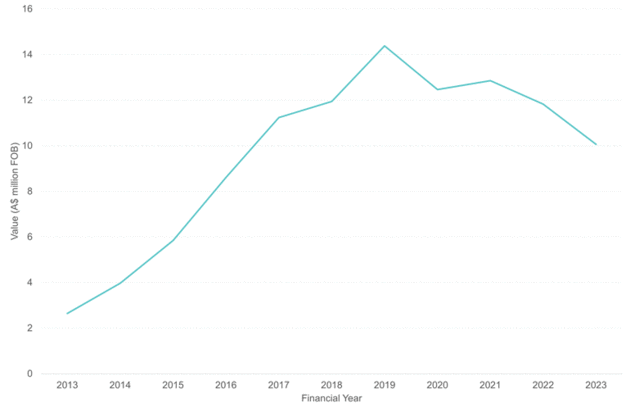Although the wine industry is facing a long-term structural decline in a number of markets, alternative wines offer opportunities for growth, IWSR's latest report says.
‘Alternative’ wines are a concept group, without agreed-upon characteristics. The IWSR describes the term as including “natural, organic, sustainable and Fairtrade” wines, although those categories tend to overlap, and can also be difficult to define.
Climate and environmental concerns were a factor in the emergence of these products on the market, however, IWSR consumer tracking data suggests that these sales are now primarily driven by a perceived association with higher quality and healthier attributes.
IWSR chief operations officer Consumer Research, Richard Halstead, said that while sustainability concerns remain driving factors for these categories, the alternative wine audience is now more focused on quality and suitability for their personal needs.
“The typical consumer audience is younger legal-drinking aged wine drinkers who have positive associations with the segment and are willing to pay for products that align with their needs and values.
“Combining this factor with the growing trend for purchasing less but better, spending on alternative wines is easier for consumers to justify.”
In the US, 30 per cent of both Gen Z and Millennial regular wine drinkers associated organic and natural wines with high quality, compared to 12 per cent of Boomers. IWSR data indicated similar trends are exhibited in the UK and Australia.
“Younger age cohorts – the most engaged buyers of alternative wines – show stronger positive associations for organic and natural wine, especially in the UK, US and Australia,” said Halstead.
“On the other hand, fewer Boomers – the age group engaged the least with alternative wines – associate them with high quality.”
Millennials are the leading demographic driving alternative wine growth, accounting for 69 per cent of consumers in China who claim to buy more than two alternative wine types.
Broadly similar trends – but with slightly lower percentages – were also present in Australia, Canada, the UK and the US.
“Millennials have the widest alternative wine repertoires,” said Halstead. “Older age cohorts show established habits, purchasing mainly organic wine across markets, as well as Fairtrade in the UK.
Opportunities for organics
Organic wines have the highest awareness levels among alternative wines, with the growing segment concentrated in Germany, France and the UK, which account for nearly 60 per cent of total volumes.
Germany and Sweden are the most mature organic wine markets, while Australia and South Korea have experienced the biggest growth in recent years, off a small starting base.
“Looking ahead, Sweden and Germany remain the key markets in which organic wine has now entered the mainstream,” said Halstead.
“Meanwhile, growth opportunities are evident in newer alternative wine markets such as Hong Kong, Brazil and New Zealand. This is driven by an increase in awareness and consideration of the category, and an increase in purchasing in New Zealand.”
Australian organic wines must have an official certification from an independent third-party, like ACO Certification Limited (ACOCL) or NASAA Certification Limited (NCO), to use the title.
Organic wine sales in the Australian domestic market have been steadily rising since 2012, from 100,000 cases in 2012 to 1.5 million cases in 2022 – and as of 2021, around 10 per cent of Australian wineries were organic.

Source: Wine Australia
In terms of exports, Australian organic wines totalled 180,000 cases valued at $10 million FOB during the 2022–23 period. Wine Australia reported that this equates to 0.3 per cent of the total volume and 0.5 per cent of the total value of Australia wine exports during the year, although only 45 out of 1220 companies exported organic wine.
The value of Australian organic wine exports has also increased to more than three times what it was a decade ago, although exports have declined in recent years.
Some growing varieties of natural wines on the Australian market are pétillant naturel, or pét-nat wines, and skin-contact wines, also known as orange wines.
Producers nationwide are experimenting with Australian pét-nat, which undergoes a secondary fermentation in the bottle, offering single-variety styles to rosé blends and mash-ups of lesser-known varietals.
Australian wineries who have introduced pét-nat bottles include Western Australian located Cullen Wines and La Violetta, Delinquente Wine from South Australia, and Australian Capital Territory winery, Ravensworth Wines.
Orange wines, made through extending contact with grape skins (and seeds) during winemaking, have recently emerged on the Australian market through wineries such as Adelaide-Hills-based BK Wines, and Melbourne-based Patrick Sullivan.
Sustainability shift in the US
Regular wine drinkers in the US have historically had a strong connection to sustainability and alternative wines, but both of these measures have fallen significantly in the past 12 months. There has been a similar trend evident in consumers willing to purchase sustainable wine, and to pay more for it when they do.
Although the proportion of sustainable-minded consumers in the US has fallen back to 2021 levels, impacting their purchasing and spend priorities – the market for organic and natural wines has remained stable, supported by the Millennial demographic.
“The US remains the market in which the most wine drinkers purchase more types of alternative wines, despite the fact that fewer American wine drinkers were highly engaged with sustainability and alternative wines this year,” said Halstead.
“This decline in engagement could be attributed to increasing economic pressure, and to the fact that some brands positioned towards health and wellness have replaced those positioned as being sustainable.”





